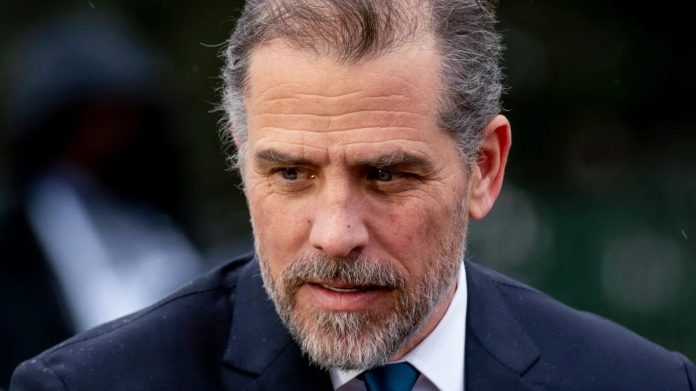In a startling turn of events, Hunter Biden, the son of President Joe Biden, finds himself at the center of a legal storm as he is indicted on serious firearm charges by special counsel David Weiss.
This latest development intensifies the legal scrutiny surrounding the younger Biden, following the dramatic collapse of a plea agreement he had reached with prosecutors in recent months.
The charges against Hunter Biden encompass two counts related to false statements made during the acquisition of a firearm and a third count for the illegal procurement of a firearm while grappling with substance addiction. When combined, these charges carry a maximum prison sentence of 25 years.
A Deeper Look into the Legal Saga of Hunter Biden
For years, prosecutors have been meticulously investigating Hunter Biden’s business ventures and personal life. This exhaustive probe seemed to reach a conclusion in June when both sides negotiated a plea agreement. Under this arrangement, Hunter Biden was prepared to plead guilty to a pair of misdemeanor tax offenses and participate in a pretrial diversion program, which would have spared him from prosecution on the serious firearm charge.
However, this promising deal disintegrated during a pivotal court hearing in July. U.S. Judge Maryellen Noreika expressed reservations about the agreement’s structure and raised questions about the extent of an immunity deal, exposing divisions between the involved parties.
Several weeks later, on August 11, Attorney General Merrick Garland elevated David Weiss, initially appointed by former President Donald Trump, to the position of special counsel. This move granted Weiss expanded authority to pursue charges against Hunter Biden in any jurisdiction across the country.
Subsequently, prosecutors informed the court that a new round of negotiations had reached an “impasse,” leading attorneys representing Hunter Biden to accuse Weiss’ office of “backtracking” on their previous agreement.
What Lies Ahead
Thursday’s indictment is unlikely to be the final chapter in this ongoing legal drama. Weiss also withdrew the two misdemeanor tax charges that were initially filed in Delaware, with the intention of pursuing them in California and Washington, D.C. – the very locations where the alleged misconduct transpired. Prosecutors have yet to provide a timeline for the pending charges.
Hunter Biden’s legal team remains steadfast in asserting the validity of the pretrial diversion agreement, a document signed by prosecutors. However, Weiss’ team contends that the probation officer never endorsed it, rendering it null and void.
The Allegations and Their Origins
The allegations outlined in Weiss’ indictment trace back to October 2018 when Hunter Biden procured a firearm. This acquisition took place despite Hunter’s later admission in his memoir, “Beautiful Things,” that he battled drug addiction during that period.
According to prosecutors, Hunter Biden obtained a Colt Cobra 38SPL revolver and provided false information on a federal form regarding his drug use. In documents submitted by prosecutors as part of the ill-fated plea agreement, it was revealed that Hunter Biden had a near-daily habit of abusing crack cocaine.
Although the law is unequivocal – it is a criminal offense to falsify information on a firearm application or to possess a firearm while being a drug user – legal experts suggest that prosecutors may face formidable challenges.
A federal appeals court in New Orleans recently ruled that drug use alone should not automatically disqualify someone from obtaining a firearm. However, it is important to note that this ruling is not binding in Delaware, where the legal proceedings are unfolding.
The Defense Perspective
Abbe Lowell, the attorney representing Hunter Biden, recently hinted that this court ruling could potentially influence their defense strategy. He noted, “If people have been paying attention, the only change in the law [since the dissolution of the plea agreement] has been a federal appeals court declaring that statute unconstitutional.” Lowell made this observation during an interview on MSNBC earlier this month.
Lowell also asserted that federal prosecutors in Delaware have never pursued this particular statute as a “standalone” charge, opting instead to combine it with additional allegations.
Uncertain Horizons
While the future remains uncertain for Hunter Biden, one immediate consequence of Weiss’ indictment is evident: President Biden will once again face the challenges of an election season, with his son’s legal troubles serving as an ongoing backdrop.
Political adversaries of the president have seized upon Hunter’s international business dealings to level accusations, painting the entire Biden family as corrupt. However, it is worth noting that no concrete evidence has emerged thus far indicating that Joe Biden personally benefited from or significantly endorsed his son’s endeavors.
Meanwhile, on Capitol Hill, House Speaker Kevin McCarthy recently announced his intent to initiate an impeachment inquiry against President Biden, citing allegations related to his son’s influence-peddling. The White House has characterized this move as “extreme politics at its worst,” emphasizing that “the president has not engaged in any wrongdoing.”
Hits: 2










